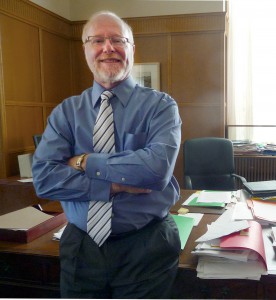
The issues of last year and a look to the future
Katrina Pyne: What changes will students notice on campus this year?
Tom Traves, president of Dalhousie University: More students on campus. We have more international students on campus, so [there will be] a much more diverse and vibrant environment, which we’re excited about.
Chris Saulnier, president of the Dalhousie Student Union: More emphasis on welcoming students back to campus. We want to make sure we encourage students to continue to be involved after Orientation Week is over, and not just fall into classes.
KP: What are the top three issues on campus to look out for this year?
TT: 1. We are in discussions with the government about funding arrangements for next year, which include not only the government operating grant but the level of tuition fees that we will charge to students. 2. Merging the Nova Scotia Agricultural College in Truro into Dal. We expect that to come to fruition in the fall of 2012. 3. Improving the level and kind of student services we have available on campus. More supports for international students, to make sure that they acclimatize to studying in a Canadian environment.
CS: 1. Parking. 2. Tuition fees and government funding to universities. 3. Watch out for changes in level of service because obviously in these financial times where the university is seeing their budget shrunk, we are starting to see some services have less funding and less support provided.
KP: What is the first item on your list of priorities?
TT: Frankly, the most significant development for us is in the immediate term is our merger with the Nova Scotia Agricultural College because that will create a new Dal campus and a new range of academic programs here. From a long-term perspective, this will be important in the history of the university
CS: Simply communicating with students. Finding new and effective ways to communicate with students on the issues that we are working on and the issues that will affect them in the future. I will be working closely with the Board of Governors to try to establish some guidelines around what consultation should look like.
KP: What are the top issues for students to be following to affect change?
TT: Students are obviously always concerned about tuition levels. They need to be engaged to understand the financial challenges the university faces, particularly in a period where the government is cutting grants to the universities and the two major sources of funding for universities are government grants and tuition fees. So I think it’s important for students to engage in that issue and speak their minds about this not only to the university but also to the government. Students have a big stake in that in a very practical way.
KP: What are some big changes that occurred over the summer?
CS: There’s the big win for us with the learning disabilities support specialist, Neera Data coming back to campus. Also in the past, Orientation Week for international students has occurred during the Students Union’s Orientation Week, so they’ve had to choose which orientation week they wanted to go to. But this year we moved the international student’s Orientation Week so they can attend both. Also, SeeMore Green is moving their garden to behind the Computer Science Building. Students should check that out.
KP: What is it like working with the DSU and Chris Saulnier?
TT: Chris is a very effective spokesperson for the university. He has the advantage of a year’s experience, so he understands the issues and processes and structures of governance in a university and he did very well with that last year. So I have a lot of respect for him and I listen carefully when he says there’s an issue that needs to be addressed. I don’t sweep that under the rug.
KP: What is it like working with Tom and the Dal administration team?
CS: It’s really nice working with Tom. He actually does come from a student union background. He was on the exec. of his student union in his undergraduate degree so he does have an understanding of the issues that we are facing and the context that I work in. We both want Dal to be a very well respected and very good institution, and we might not always agree on how to get there, but we both know that at the end of the day, we are working towards the same goal.








